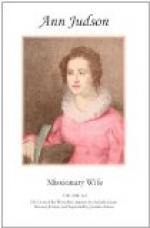“Satan in days of old
was holy,
But he transgressed God’s
law;
Satan of old was righteous,
But he departed from the law
of God,
And God drove him away.”
They say that God formerly loved their nation, but on account of their wickedness he punished it, and made them the degraded creatures they now are. But they say “God will again have mercy upon us, God will save us again.” One verse of one of their songs is,
“When the Karen king
arrives
Everything will be happy;
When Karens have a king
Wild beasts will lose their
savageness.”
Professor Gammell says, in substance, that they present the extraordinary phenomenon of a people without any form of religion or established priesthood, yet believing in God, and in future retribution, and cherishing and transmitting from age to age a set of traditions of unusual purity, and containing bright predictions of future prosperity and glory.
When Ko-thay-byu, the poor convert already mentioned, was baptized, he naturally carried to his countrymen “the thrilling news, that a teacher from a far distant land had come to preach a new religion, a religion answering to the religion of their fathers.” Others came to listen, and to carry back to their secluded hamlets the joyful tidings; until “from distant hills and remote valleys and forests, Karen inquirers flocked to Tavoy, and thronged around the teacher;” listening to the new doctrines with childlike simplicity and uncommon sensibility. Among other singular stories that they related to the wondering “teacher,” one was, that more than ten years before, a book in a strange tongue had been left among them by a foreigner, who commanded them to worship it; which command they had faithfully obeyed. Mr. Boardman felt the strongest curiosity to see this deified book, but owing to the prevalence of the rains, he was not gratified till the following September. He was then waited on by a large deputation of Karens, bringing with them in a covered basket, the mysterious volume, wrapped in fold after fold of muslin; on removing which it proved to be an Oxford edition of the Common Prayer Book in the English language! With the greatest simplicity they asked Mr. B. if this book contained the doctrines of the new religion, and if so, requested to be taught its contents. Mr. B. assured them that the book was good, but should by no means be made an object of worship; and accepting it from them, he gave them in its stead, portions of the Scriptures, translated into a language they could understand. They entreated him to visit them in their own villages, assuring him of the readiness of their tribe to welcome him, and to receive the gospel; and, struck with their earnestness and candor, he promised at some future time to yield to their request.
The sorcerer who had preserved the book, and prescribed to the simple heathen the forms of its worship, threw away his cudgel, or wand of office, and laid aside his fantastic dress; and Mr. Boardman sent the mysterious volume to America, to be deposited in the museum of the Baptist Missionary Society.




